 |
 |
|||||||||||||||||||||
|
|||||||||||||||||||||
 |
||||||
|
||||||
 |
|||||||||||||||
|
 |
||||||||||||||||||
|
||||||||||||||||||
 |
||||||||||||||||||
|
||||||||||||||||||
 |
|||||||||||||||||||||
|
|||||||||||||||||||||

Click here for more Profiles in Bias
World News Tonight
With Peter Jennings
20 Years of Liberal Bias
|
On September 5, 1983, Peter Jennings took the helm of ABC’s World News Tonight as its sole anchor. While based in ABC’s London bureau from 1978 to 1983, Jennings had shared anchor duties with Chicago-based Max Robinson and the Washington, D.C.-based Frank Reynolds, who was the newscast’s main anchorman until his death in July of 1983.
Castigating Republicans — The 1994 midterm elections gave Republicans a majority in both houses of Congress for the first time since the 1950s. Jennings reacted by demeaning the voters, casting the policies of the new Congress as destructive and mean-spirited, and commiserating with Bill Clinton about the public’s lack of regard for his liberal policies. He continued to rail against GOP policies, especially tax cuts, for years. Spanking voters for electing conservatives: “Some thoughts on those angry voters. Ask parents of any two-year-old and they can tell you about those temper tantrums: the stomping feet, the rolling eyes, the screaming. It’s clear that the anger controls the child and not the other way around. It’s the job of the parent to teach the child to control the anger and channel it in a positive way. Imagine a nation full of uncontrolled two-year-old rage. The voters had a temper tantrum last week....Parenting and governing don’t have to be dirty words: the nation can’t be run by an angry two-year-old.” Voters didn’t give Bill Clinton enough credit: “I’d like to start, if I may, with what I think you may think is a puzzlement. You’ve reduced the deficit. You’ve created jobs. Haiti hasn’t been an enormous problem. You’ve got a crime bill with your assault weapon ban in it. You got NAFTA, you got GATT, and 50 percent of the people don’t want you to run again. Where’s the disconnect there?” Only naive racists support welfare reform: “The welfare debate has been getting more intense, ever since President Reagan regularly vilified what he referred to as the ‘welfare queens.’ Attitudes about people on welfare are sometimes based more on myth than reality. Most welfare mothers have only one or two children. Most welfare mothers had their first child when they were adults, not teenagers. Most people on welfare are not black.” Republicans want to destroy the planet: “Next week on ABC’s
World News Tonight, a series of reports about our environment which will tell you precisely what the new Congress has in mind: the most frontal assault on the environment in 25 years. Is this what the country wants?” “[Republicans] are engaged in the most dramatic overhaul — or assault, some would say — on environmental legislation in 25 years.” Much better to keep punishing success: “Well, it helps to know this about a flat tax. It’s a very radical notion, and it’s not nearly so simple as it sounds....It is supposed to encourage savings and investment because profits would be tax free. But will plumbers be hurt more than plutocrats?...Certainly the rich would do better than the middle class....No Western country has ever tried to make such a seismic shift. How big will a flat tax need to be to raise the money which the government needs to run the country?” Those intolerant Republicans: “We begin tonight with what you could call zero tolerance....Today by the time Mr. Dole spoke by satellite to his party delegates, who were already gathered in San Diego, all notions of tolerance on the subject of abortion had disappeared from the party’s platform.” “The right to abortion has never been an overwhelming issue for women at election time. But this fight within the Republican Party has many women questioning how far this party will go to limit their rights.” Tax cuts deprive government: “Mr. Bush believes in a universal tax cut, which would mean a very large chunk of money not available for government programs.” Ridiculing tax relief: “The President’s tax cut is beginning to show up. Will three extra dollars stimulate the national economy?”
Hungry kids vs. White House greed: “Twelve million American children who do not have enough to eat, who lack adequate health care, and who are behind in schools and being left behind in life. Much of our broadcast will be dedicated to that, which makes the major news in Washington today seem even more of a contrast. The President’s Chief of Staff, John Sununu, is at the center of attention again, having to do with his use of limousines and corporate jets.” Poverty is a national disaster: “When you get close to the poor, you recognize right away that very often the level of assistance which they get from government doesn’t lift them up to the legal poverty line, let alone above it, which seems to say your congressmen and your state legislators have failed to recognize that children and families in poverty are a national disaster. In your name, they often argue about other priorities and welfare cheats. Twelve million American children who cheat.” Let’s copy France: “On the American Agenda tonight, France. One of the things we have found with every subject we address on the Agenda...is how often there are lessons to be learned from other societies. It is one thing for the United States to spend less on children than almost any other country in the industrialized world. It is another to see what those countries get in return for their dollar, or in this case, their franc.” America is so backwards: “The United States has this unfortunate distinction: It is one of only two countries in the industrialized world, the other is South Africa, that does not guarantee basic health care for all its children. “ Really, we have to be more like the Europeans: “Those who argue for universal coverage very often make the point that the U.S. is practically alone in the industrialized world without it. Thirty million people without health insurance in the U.S. — compare that to Europe and Japan....In the great debate over universal coverage, a good many Americans believe it comes down to choices between haves and have-nots.” Millions hate deregulation: “We begin tonight with something to think about later this evening. You’re at home or in the office or the car, and you go to make a phone call. What do you think the chances are that when you do, you’re going to be ripped off by the phone company? There are millions of complaints in this age of deregulation, millions. And it’s a big enough problem for Congress to take up tomorrow.” We’re the “least generous” in saddling employers with new mandates: “The U.S. is actually the least generous of the industrialized nations. In Sweden, a new mother gets 18 months of maternity and parental leave, and she gets 80 percent of her salary for the first year. Mother or father can take the parental leave any time until a child is eight. England gives 18 weeks maternity leave. For the first six weeks, a mother gets 90 percent of her salary from the government and $86 a week thereafter. German women get two months of fully paid leave after giving birth. The government and the company kick in, and either parent has the option of three full years in parental leave with some of their salary paid and their jobs protected.” Price controls for prescriptions, now: “The pharmaceutical industry’s products have saved and improved millions of lives, but overall, are we getting our money’s worth? We do not believe so....The rules by which this hugely profitable industry operates do not always serve consumers adequately, and nothing is going to happen – no matter how angry consumers get – unless the Congress and the President decide that the time has come. The country can do better.”
Jennings’ generosity with other people’s money did not extend to the defense budget — especially in his analysis of the proposed national missile defense system. Let’s reverse those budget totals: “And yet, Congresswoman Schneider, in 1989, fiscal 1989 as we say in America, the Environmental Protection Agency got 5.1 billion dollars and the Defense Department got 290 billion dollars. What’s that tell us about our priorities?” Don’t waste money on bombers: “But if America wanted to go back to the Moon, it would take three years to get ready again. It might cost $10 billion to send men to Mars, which by the way is what it cost to produce just four of the nine B-2 bombers that Congress wants and the Pentagon says it does not need.” Let’s not be optimists: “We’re going to take ‘A Closer Look’ tonight at the plans for an anti-missile defense system. The one that has never been proven to work and may never work.” There’s a fire in your e-mail: “There is a little skepticism in the air here today. Some cynicism, too. The government has an idea of how to spend $50 billion of your money. That’s BILLION. It will be spent on building a system to safeguard the national security – but by the government’s own assessment it will probably not be foolproof, it will unnerve America’s allies, and in the end it may cost considerably MORE than $50 billion. A more critical assessment is that this system can never be made to work, that it will torpedo the basis of all arms control arrangements, and that in any event, any terrorist or ‘rogue nation’ that means to wreak havoc on U.S. soil can do so in ways that this system will not prevent.” A liberal disclaimer: “One other note. Critics often object to the animation in news reports because the animation usually has the systems working.”
Jennings’ Liberal Hero of the Week From the mid-1980s through the mid-1990s, World News Tonight celebrated heroes each Friday — political leaders, athletes, actors and anonymous do-gooders — by naming them the “Person of the Week.” The MRC documented the bias of this regular ABC News feature in 1992 and again in 1994. Feminism helps us all (except maybe the unborn): “And, so we choose Betty Friedan because she had the ability and the sensitivity to articulate the needs of women, which means that she did us all a favor.” Carter “renewed respect” for America: “The person we have chosen this week has continued his life with distinction, considerable grace, and with a very strong commitment to peace and justice....In the public’s mind, the scales were never balanced. [Former President Jimmy] Carter’s success in foreign affairs — peace between Egypt and Israel, renewed respect for the United States in Latin America — have always been outweighed in the public mind by the hostage crisis.” Marian Wright Edelman loves children: “[She’s] always on Congress’s back for coming up with too little money....From her point of view, as you hear, it is a matter of the whole country’s future. The children are fortunate to have such an advocate.” Blessed are the federal regulators: “This week we have chosen a man who has appeared on our radar many times, for many reasons, a man who makes an enormous difference because he takes his public service so seriously...It is always the children for David Kessler. Dr. Kessler was trained as a pediatrician...All of this has made David Kessler something of a folk hero. Sometimes in Washington they call him `Eliot Nessler,’ after Eliot Ness, who fought the mob during the ’30s...He conducts himself as the people’s guardian in matters of food and drugs with the utmost conviction.”
Still More of Jennings’s Liberal Heroes Jennings did not confine his praise for liberals to Fridays, and his penchant for promoting liberal activists continued long after ABC cancelled its “Person of the Week” segment. Courage to make you pay up: “When he entered the race nearly a year ago, he [Democratic presidential candidate Bruce Babbitt] had the courage to say that as President he would probably have to raise taxes. And he never recovered from his courage.” The fingers, the palms, even the thumb: “He’s become a little more disciplined, Bill Clinton, but you know he loves a crowd. And he has, don’t want to get carried away here, but he has the kind of hands that people respond to.” Try to overlook Louis Farrakhan’s anti-Semitism and weirdness: “It would be astonishing if this public performance of Farrakhan were to end or even minimize the controversy which he inspires in the country as a whole, but it would be a terrible mistake not to recognize that here today, he inspired many people, and in a broader sense, as one participant after another has reaffirmed, this day, at this time and this place, really did mean unity over division.” Clinton surrounded himself with geniuses: “Good evening. The man who presided over the best economy in a generation is going back to private life. The Secretary of the Treasury, Bob Rubin, who said today that he really was resigning, has been described in such glowing terms that he’d begun to sound indispensable. All sorts of people today, including the President, have called him the best Treasury Secretary since Alexander Hamilton, who was the first Secretary in 1789 and did an enormous amount to put the United States on firm financial footing.” Bill’s indispensable life partner: “He’s leaving the greatest thing in his life, and you are about to meet the challenge of the biggest thing, certainly, in your political life. What if he needs you?” Jimmy Carter’s greatness: “It was a great day for Jimmy Carter. The former President heard early this morning that he had won the Nobel Peace Prize. Mr. Carter was President from 1977 to 1981. He is the least popular President in the period after World War II. In the mid-1990s, on the other hand, he was occasionally introduced as the only man who has ever used the presidency as a stepping stone to greatness.”
Jennings routinely presented the many Clinton scandals as dastardly inconveniences that get in the way of American progress. He felt Bill Clinton’s pain when the joy of being President was ruined. Dick Morris ruined Bill’s convention moment: “Here in Chicago, the President has been fine tuning, as they say, the speech he will be giving to this convention and to the country tonight, and he has a lot to be pleased about: A very upbeat convention, a very successful train trip here with rising poll numbers to accompany it, and a very important set of statistics about the economy today, which he will certainly point to as evidence that the country should re-elect him. And then along comes a nasty little scandal to take the edge off the good news, at least for one day.” Hearings into scandal aren’t a good use of resources: “When we come back, two investigations of fundraising abuse, two of them on Capitol Hill. Is it a waste of time and money?” The sooner they’re over, the better: Looking for an excuse to ignore Monicagate: “We know from just answering the phone around here that the amount of attention we are giving this story is, at the very least, debatable. We in the news [business]....are devoting major time and resources to these events, but have we been carried away, are we doing too much and are we not being fair?” We’re the pro-Clinton clique: “Mandy, who do you think is now going to carry the water, briefly, for the anti-Clinton clique in the country or the anti-Clinton people in the country?” Clinton’s accuser is icky: “I certainly won’t go out of my way to say hi to her.” Finding the heart of America: “Good evening. We begin tonight with the voice of the people heard from the Senate gallery today during yet another procedural vote at the President’s impeachment trial....’God almighty,’ the man said, ‘take the vote and get it over with.’ He was arrested, — that’s him in the beard, slightly balding, on the right. He may think it was worth it, speaking as he does for so many Americans, whether they believe the President should be convicted of perjury and obstruction of justice or not. The best that we can say tonight is they are getting there.” Another nightmare has ended: Another Clinton moment ruined: “I gather that the Independent Counsel must have been hitting these people with a sledgehammer in the final days of the presidency....His critics will not be disappointed to see this happen, and his enemies too. Nonetheless, it’s a very sad, almost tragic way for the President to spend his last day in office.”
Castro’s communist success story: “Medical care was once for the privileged few. Today it is available to every Cuban and it is free. Some of Cuba’s health care is world class. In heart disease, for example, in brain surgery. Health and education are the revolution’s great success stories.” The KGB is more open than the CIA: “A brief report from the Soviet Union today to match the extraordinary times. Can you imagine five CIA agents answering the public’s questions during a live television show? Not likely. In the Soviet Union today, television viewers had the unheard of opportunity to ask questions of five KGB agents on a show broadcast live nationwide. Here’s one example. One listener asked, ‘Don’t we have too many secrets?’ ‘Yes,’ replied an agent, ‘and some stupid ones.’” The communists win again: “For the Bush administration and the Reagan administration before it, the [ABC
News/Washington Post] poll hints at a simple truth: after years of trying to get rid of the Sandinistas, there is not much to show for their efforts.” The Russian people really loved their dictator: “Suddenly, from about half the way across the square, I heard this, ‘Peter, Peter, come, I want you to meet some people.’ And he [Mikhail Gorbachev] plunged into this crowd and it was, again, impressionistic, right? But it was clear to me that in touching these people...it was clear that he wanted us to see that here were people who on a one-to-one basis really felt positively about him.” China isn’t communist anymore: “Various Chinese tell us today that the only people who think China is a communist country now live in Washington. Today in China, for many people, it is really about the pursuit of wealth.” Really, China isn’t communist: “Finally this evening, part history and part myth. It was 50 years ago this week that the People’s Republic of China came into being, Mao Tse-Tung its founding father. China’s going all out to celebrate the triumphs of the communist revolution and ignore its failures. And all the ceremony will also ignore the fact that China, today, is hardly a communist country.” Missing the old dictatorships: “It is probably hard for most Americans to imagine anyone feeling nostalgic about living behind the Wall. It may also be hard to imagine that anyone in the Western part of Germany would miss the Wall either. But miss it, some people do.” There’s no simple answer in choosing between the U.S. and Cuba: “Beyond the questions of custody, the Cuban-American community in Miami has always argued, almost every day in fact, that Elian Gonzalez would have a better life here in the United States than in Cuba. It’s been argued before, and there’s not a simple answer.” The Soviets were more silly than serious: “There are some of you, I’m sure, who remember the days when we in the West were afraid that the Soviet Union would outdo the West technologically. They had been first into space. The CIA was pretty impressed, remember? And then the Soviet Union fell apart and we discovered how far behind they really were — not that they weren’t trying....Ah, yes, we used to take the Soviet Union so seriously.”
After the September 11th terrorist attacks, all of the anchors gave viewers fair and even-handed coverage, but Jennings was the first to revert to liberal form: Adversarial coverage of U.S. actions and U.S. policies, and less judgmental coverage of tyrants and terrorists. During the war in Afghanistan, World News Tonight gave far more airtime than the other broadcast networks to Taliban claims of massive civilian casualties that Jennings and his team could not verify, and which ABC reporter Jim Wooten later commendably debunked as inflated enemy propaganda. American food is just propaganda: “One other item about these food and medicine drops. They’re not popular with everyone. The international relief organization Doctors Without Borders, which won the Nobel Peace Prize for relief work, described it today as military propaganda designed to justify the bombing. The Bush administration points out it also has committed $300 million in other aid. It’s a question, ultimately, of getting it there.” Demanding immediate results: “The Secretary of Defense said today that those people who are questioning the effectiveness of the U.S. bombing campaign in Afghanistan are too impatient, and the Chairman of the Joint Chiefs of Staff said much the same thing. The Pentagon is being pressed harder to be specific about what it has accomplished so far. The bombing campaign against the Taliban is now entering its fourth week, and the Taliban are still standing.” “Insular” Americans need enlightening: “It isn’t just about campaigning against terrorism around the world. That’s just too simple. There are a lot of root causes for dissatisfaction around the world, and I think for the country to exercise real global leadership, when globalization in itself is kind of complicated, it’s not just American business or selling American culture around the world. I think it’s a very big challenge for a leader to get us all engaged in that because, you know, Americans are pretty insular people for the most part.”
One Man’s Terrorist Is Another Man’s Freedom Fighter Even as the U.S. fought a war against terrorism, Jennings went out of his way to hide the anti-American crimes of Hezbollah, a Palestinian independence group that killed more than 300 Americans in the 1980s with car bomb attacks against the U.S. embassy and Marine barracks in Beirut, Lebanon.
Only the government’s opinion? “In North Carolina, two men went on trial for smuggling cigarettes to allegedly help the group Hezbollah in Lebanon, which the government calls a terrorist organization. Their lawyer says it will be extremely hard to find an impartial jury.”
Jennings displayed an antagonistic attitude towards’ Bush’s Iraq policies for months prior to the actual start of the second Gulf War in March, 2003. Even after the rapid collapse of the Saddam Hussein’s dictatorship, Jennings — more than any other news anchor — highlighted setbacks and scolded the military for its mistakes, leading to at least one embarrassing retraction. Beating the war drums: “Wherever you live in the world today, the sound of war drums being beaten in Washington has become unmistakable. With the first anniversary of the September 11th attacks behind us...the administration’s preoccupation with Saddam Hussein and weapons of mass destruction has rapidly become the number one issue in international affairs.” Unlike Republicans, Saddam funds the arts: “This week we were surprised to see several hundred artists and writers walking through the streets of Baghdad to say thank you to Saddam Hussein. He had just increased their monthly financial support. Cynical, you could argue with this particular time, but the state has always supported the arts, and some of the most creative people in the Arab world have always been Iraqis. And whatever they think about Saddam Hussein in the privacy of their homes, on this occasion they were praising his defense of the homeland in the face of American threats.” Bush is spoiling for war: “The UN weapons inspectors go back to Baghdad this weekend. They have not been happy with Iraqi cooperation so far. We’ll see if the Iraqis do any better — and if that means anything to the Bush administration.” The U.N. can solve this: “So many people don’t understand why you shouldn’t let the inspections continue if they are accomplishing anything.” Looking Forward to a Long War: A sad day for sculptors: “Saddam Hussein may have been, or may be, a vain man, but he has allowed himself to be sculpted heavy and thin, overweight and in shape, in every imaginable costume — both national, in historic terms, in Iraqi historic terms — in contemporary, in every imaginable uniform, on every noble horse. The sculpting of Saddam Hussein, which has been a growth industry for 20 years, may well be a dying art.” Curious about Saddam’s sensitive side: “This is not, as you heard so many times today, the end of the war. But it is an occasion to wonder, as we sometimes do, did Saddam Hussein ever understand what people thought about him? Did he care? I’m Peter Jennings.” Oil-obsessed America neglected to save civilization: “The country has been a living archive of man’s earliest history, where real connections can be made between then and now, which is why the Pentagon is being so widely criticized for not protecting the history when it captured the capital city....The Pentagon has said, in reply, look, this is war, and stuff happens, the U.S. was fired on from the museum grounds. Not a satisfactory answer for people who say that if the U.S. managed to protect the Ministry of Oil, why not this repository of civilization? Why, they ask, is neglect forgivable?” On second thought: “The looting at the national museum may not have been as extensive as some people first reported. A Marine colonel who’s been investigating tells us today that hundreds of items have been recovered from smugglers, Iraqis have returned items they may have had for safekeeping, other pieces have been found in the rubble, and it turns out that many pieces were removed before the war. Twenty-seven so-called ‘significant pieces’ were stolen, some of them priceless, but those who said that more than 150,000 items were looted appear to be wrong.”
When the far left would shout against U.S. military intervention — during both the first and second Gulf Wars — Jennings made sure anti-war protesters were presented as a credible, reasonable, patriotic opposition group, downplaying any extremism or anti-Americanism that emanated from them. Jennings portrayed those who dissented from the anti-war line as chilling opponents of free speech. Pleading for understanding: “At every anti-war demonstration, they carry the flag high to make the point, they say, that American troops in the Gulf have their support. They object to the government policy that sent the troops there.” Won’t someone make the anti-war protesters’ case? Marxism for dummies: “By the way, ‘No blood for oil,’ from many people who are opposed to the war is, is not complicated at all. They believe the United States wishes to occupy Iraq in the long term to have the oil. Just so we understand why they wear those little buttons, ‘No blood for oil.’” The right to free speech has been cancelled: “When we come back this evening, being against the war and in show business — and the people who want to punish you for that.”
While Jennings has occasionally commented that conservatives have not received enough attention in the “objective” press, more often he has dismissed the claims of liberal media bias. We have no axe to grind: “I think there is a mainstream media. CNN is mainstream media, and the main, ABC, CBS, NBC are mainstream media. And I think it’s just essentially to make the point that we are largely in the center without particular axes to grind, without ideologies which are represented in our daily coverage, at least certainly not on purpose.” We were very tough on Clinton: “We all have baggage, but one of the good things about journalists is that they recognize bias and work hard to keep it out of their coverage....You can have all sorts of people who voted for Bill Clinton, but the media gave Clinton one hell of a time. Now we hear a lot from people who complain that we don’t give George Bush as hard a time as we gave Bill Clinton.” George Stephanopoulos is scrupulously nonpartisan: “If there’s ever been a guy who’s come out of an administration, who has made a cleaner break, and proved himself as a journalist than George Stephanopoulos, I don’t know who it is.”
Related Items:
Home | News Division
| Bozell Columns | CyberAlerts |



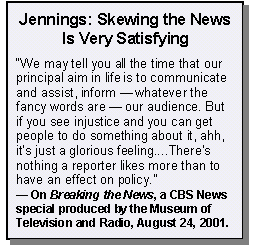 World News Tonight promoted liberal policy ideas in an ongoing feature segment called
“
World News Tonight promoted liberal policy ideas in an ongoing feature segment called
“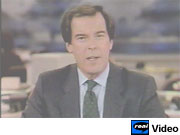
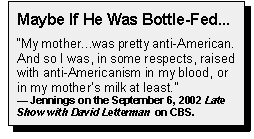
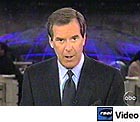
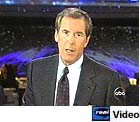

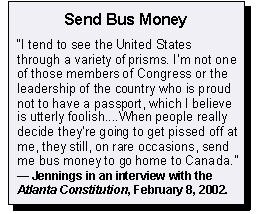 “Today [the site of the former American embassy in Lebanon] is an empty lot. This is where the U.S. experienced the first suicide bomber. In 1983 a man simply drove his truck to the front door and blew himself up. Sixty-three people died. Later that year, the Marine barracks here were destroyed in much the same way; 241 Marines died.”
“Today [the site of the former American embassy in Lebanon] is an empty lot. This is where the U.S. experienced the first suicide bomber. In 1983 a man simply drove his truck to the front door and blew himself up. Sixty-three people died. Later that year, the Marine barracks here were destroyed in much the same way; 241 Marines died.”